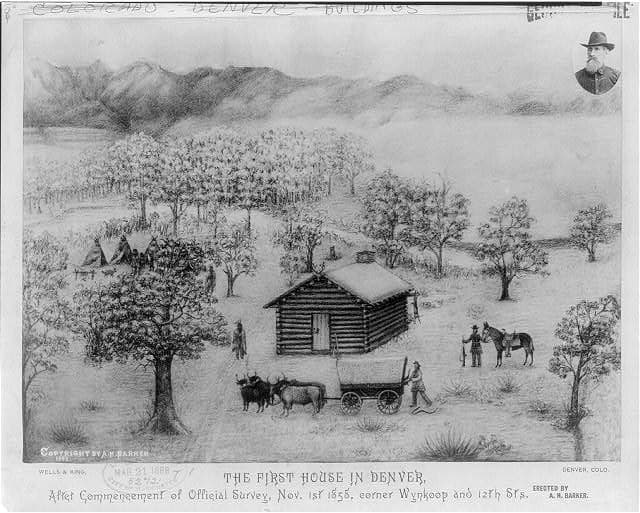Good morning. Today's news roundup includes your guide to the last days of Denver Restaurant Week, a perspective on the R Line, Park Hill news, the tragedy of streaming services and more. Also, here's an 1888 illustration of the purported "first house in Denver," aka the first permanent white settlement, depicting a scene from 1858.

It's still Denver Restaurant Week(s):
The multi-week event ends Sunday, meaning you still have a chance to taste the creative multi-course meals on offer around the city. Ashley has some recommendations for several neighborhoods. (Denverite)
The R Line is auto-oriented:
David Sachs finds that most stations on the new Aurora rail link are surrounded by parking, while pedestrian options and bike facilities are limited. (Streetsblog)
Puck v. Musk:
Wolfgang Puck's company filed suit in federal court against Kimbal Musk's company a week ago. Both of them operate restaurants called "The Kitchen." Boys, boys, boys. (DBJ)
A block of Park Hill could change:
Park Hill Commons would clear a block of Fairfax Street to make way for a park, restaurants, office space and dozens of new housing units, as Adrian explains. (Denverite)
DCPA addresses diversity:
Denver Center for the Performing Arts has hired the firm ArtEquity to "tackle a lack of diversity in both its ranks and patrons," as Danika Worthington reports. About 15 percent of DCPA's audiences are not white, compared to 31 percent of Colorado's population. (DP)
Mumps outbreak:
There have already been 49 cases of mumps in Colorado this year, almost ten times the average for whole years. The state record is 51 cases, in 2006, as Mark Belcher reports. Expert advice: Get vaccinated. (CBS4)
Goodbye, Video Station:
Netflix has fewer than 5,000 movies on its streaming service. At Boulder's Video Station, you could choose between 43,000. That's why people's feelings about video store closings are more than just nostalgia. This Charlie Brennan obituary for the store made me genuinely sad and a little worried. (Boulder Daily Camera)
Restricting public records:
Colorado's attorney general wants to remove the names of people who aren't public employees from public records. That could make it harder to figure out who's talking to government officials and why, as Brian Eason reports. (DP)













